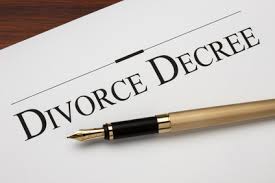When filing for divorce, emotions often run high, especially if children are involved. Add to this the stresses of court proceedings and reaching agreements in terms of finance and property and it soon becomes a daunting task.
If you’ve made the decision to initiate divorce proceedings, here is the second in our three part guide to help prepare you for the process.
Apply for a decree nisi
In order to finalise a divorce, nullity or judicial separation, you must apply to the courts for a decree, the first of which is a decree nisi. In an undefended divorce, you must provide a written statement to confirm that divorce papers have been received, and that both partners agree to the grounds for divorce (link back to 1st post), which include:
- Adultery
- Unreasonable behaviour
- Desertion after two years
- Separation with consent after two years
When the court has received the decree nisi application, it will be reviewed by a judge before a certificate of entitlement to a decree is sent to you and your partner stating when the decree nisi will be granted.
In a defended divorce, it is still possible to apply for a decree nisi, however there will be a ‘case management hearing’ in court so the divorce can be discussed before a judge decides whether to grant the decree nisi or not.
When a decree nisi is granted
If the judge agrees with your application, you and your partner will be sent a certificate of entitlement to a decree and the decree nisi. After a further six weeks, you are able to apply for a decree absolute, which, when granted, means the divorce is final. If an application has made that one party pay the costs of the divorce, the judge will decide if a costs order should be made.
When a decree nisi application is rejected
You will be sent a ‘notice of refusal of judge’s certificate’ form if your application is rejected. This will tell you what needs to happen next. It could mean that the judge requires more information to decide if the application can go through, it may require you to attend a court hearing, it could be as simple as an error on the form.
Apply for a decree absolute
Unlike nullity or judicial separation, a divorce requires two decrees in order for the marriage to be officially over. A decree absolute is the legal document that ends your marriage and can be applied for six weeks and one day after your decree nisi is granted. If your partner began divorce proceedings, but did not apply for a decree absolute after six weeks and one day, you can do so, but must wait an extra three months on top of the original six weeks. If neither yourself or your partner apply within one year of the granting of your decree nisi, it will be necessary for the delay to be explained to the court.
Before a decree absolute is granted
Resolving financial or property matters often comes after the granting of the decree nisi by applying for a financial order or an order pertaining to the marital home. This can take much longer than the divorce itself.
Known as Financial Remedy Proceedings, it is wise to seek the expertise of a family law solicitor when dividing assets, making an offer to settle, or accepting an offer to settle. If an agreement cannot be reached between you and your partner, you should attempt to resolve the matter if possible by attending mediation however if this is not possible you can apply to the court for intervention. Professional experience and legal advice from a family lawyer will help clarify the court’s decisions.
Receiving your decree absolute
When the courts are satisfied that you and your partner have met time limits and there is no reason a divorce should not be granted, you will both be sent a decree absolute. This means the divorce is final, that you are no longer married, and that you are able to remarry.
Backhouse Solicitors are experts in all areas of family law. If you would like further advice or guidance relating to your individual circumstances please contact our legal team today on 01245 893400 and book a FREE 30 minute consultation.
This firm is also able to offer fixed fee packages for dealing with undefended divorce proceedings, whether you are instigating the proceedings or are the respondent.
We appreciate that divorce proceedings can cause high emotions however we will seek to deal with matters as amicably as possible on your behalf.
The Backhouse Solicitors Team
Tel: 01245 893400
Email: info@backhouse-solicitors.co.uk
Web: www.backhouse-solicitors.co.uk






